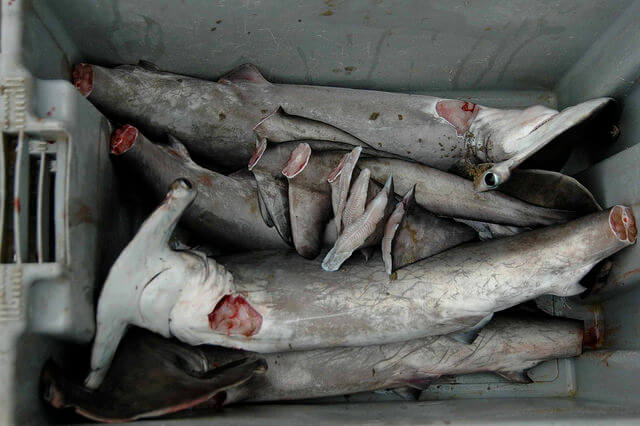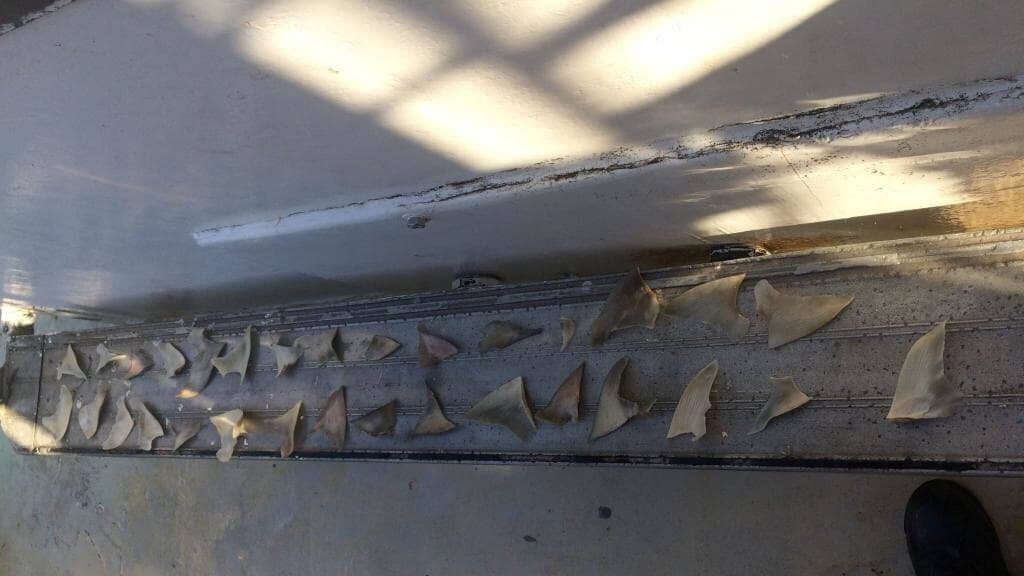For immediate release: 4 April, 2019
The discovery of illegal shark finning in the Great Barrier Reef shows why independent observers need to be on boats to stop this activity, Australian Marine Conservation Society (AMCS) and Humane Society International (HSI) says.
A skipper and deckhand were fined $7000 after Queensland Government staff raided their boat and found 31 shark fins on board at the port in Cairns.
Shark finning – the practice of live finning and dumping of sharks at sea – is illegal in Australian waters. However, under Queensland law, sharks can still be cut up and processed at sea providing their separated fins are also kept alongside their trunk or fillets.
Dr. Leonardo Guida, Senior Shark Campaigner at AMCS said, “I’m horrified but tragically not surprised. We’ve been demanding for years that the Queensland Government have independent observers on fishing vessels – without observers and with clear illegal actions happening, we simply cannot be sure live shark finning isn’t happening. What’s even worse is that it could be happening in our world-heritage listed Great Barrier Reef.”
Queensland’s current shark fin laws create a loophole that allows “high grading”, where high value fins and meat can be retained, but are not necessarily from the same shark, which leads to dumping of unwanted sharks.
Dr. Guida added: “The Queensland Government knows that a ‘fins naturally attached policy’ will close a loophole that enables illegal live finning to occur – harvested sharks would have to be brought back to land in one piece. The Government has turned a blind eye to the issue, and here’s crystal clear evidence that they’re failing sharks, the Great Barrier Reef, and the Australian community.”
Lawrence Chlebeck, Marine Campaigner at HSI said, “Endangered hammerhead sharks¹ are particularly vulnerable, their fins being some of the most prized in the fin trade. We’ve seen their populations fall by up to 92% in Queensland in as little as 55 years² and yet the endangered scalloped hammerhead can still be harvested from the sanctuary of Great Barrier Reef Marine Park.”
AMCS and HSI support the Queensland Government’s Sustainable Fisheries Strategy 2017-2027³ and are actively engaged in the reform process. The Queensland Government is currently failing to meet its objectives and both AMCS and HSI demand that the Queensland Government immediately implement an observer program and mandate that all sharks be brought back to land with their fins attached.
People can add their voice to AMCS and HSI’s demand by visiting www.sharkchampions.org.au
For Media contact:
AMCS: Ingrid Neilson 0421 972 731
HSI: Ben Vozzo 0450 258 057
Additional Information.
- In 2018, the Federal Government passed an amendment to the EPBC allowing for the scalloped hammerhead to be fished from the Great Barrier Reef Marine Park (GBRMP). Under the GBRMP legislation, any species listed in the EPBC Act is fully protected, irrespective of its EPBC status/category. Currently the scalloped hammerhead qualifies for endangered status in the EPBC Act but is listed as Conservation Dependant, meaning that it can be fished providing certain conditions are followed – fins naturally attached being one of them.
- The Queensland-managed East Coast Inshore Fin Fish Fishery has recently been accredited with a Wildlife Trade Operation (WTO) permit under the federal Environment Protection and Biodiversity Conservation Act. The WTO allows the fishery to continue exporting product. The federal Environment Minister, Melissa Price, can attach conditions to the accreditation.
IMAGES
Shark fins seized off a commercial fishing vessel in Cairns.
Picture: Department of Agriculture and Fisheries
https://www.cairnspost.com.au/news/cairns/authorities-find-31-shark-fins-on-commercial-fnq-fishing-boat/news-story/77fba95ffafe2c9bfdf27aa4db86f395

Finned hammerheads in bin
Photo from Australian Marine Conservation Society
High resolution image file: https://www.flickr.com/gp/86069511@N04/1TGE39
SOURCES
- Great Hammerhead IUCN Red List https://www.iucnredlist.org/species/39386/10191938; Scalloped Hammerhead IUCN Red List https://www.iucnredlist.org/species/39385/10190088.
- Roff, G et al. (2018) Decline of coastal apex shark populations over the past half century. Communications Biology, 1(223). https://doi.org/10.1038/s42003-018-0233-1
- https://www.daf.qld.gov.au/business-priorities/fisheries/sustainable/sustainable-fisheries-strategy

